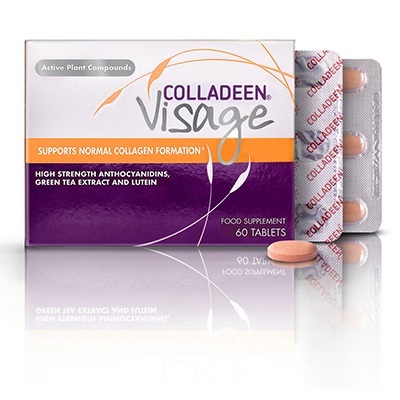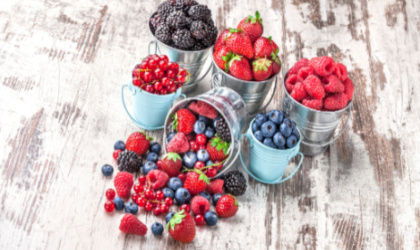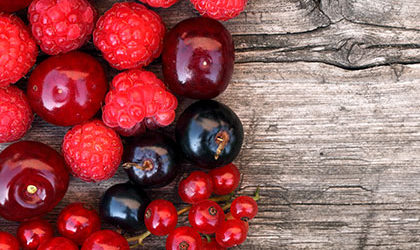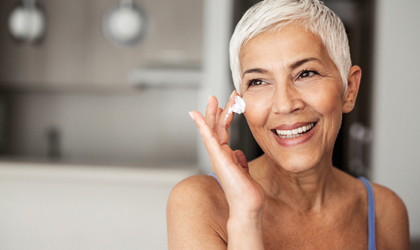
The first noticeable signs of skin ageing begin around the ages of 25-30, depending on genetics and lifestyle choice. But don’t give up hope! There are extrinsic factors that are within our control, such as exposure to pollutants, sunlight, diet and lifestyle, read on to find more information.
What are wrinkles?
Over time, fine lines start to appear on our skin, which develop into wrinkles. Certain areas of the face are more likely to develop fine lines and wrinkles first, such as around the eyes, where the layers of skin are thinner and more delicate, known as crow’s feet and around the mouth – laughter lines.
It’s not just ageing that is responsible for the change in our skin. Skin flexion, or facial expressions, over time, like frowning, laughing, or scrunching your eyes in sunlight, are also thought to be culprits to wrinkles [1], and exposure to sunlight is also a known factor.
What is the main cause of wrinkles?
Our skin depth and health are supported by substances known as collagen, elastin, and hyaluronic acid, they keep our skin firm and smooth, however, these begin to deteriorate as we age. In fact, from the age of 25, collagen levels in the dermal tissue (mid-layer) decline at a rate of 1% per year, reducing skin thickness and firmness. This is a naturally occurring event and intrinsic to the ageing process.
Do lifestyle and other external factors affect the skin?
Oxidative stress, like the examples listed below, creates free-radicals that damage the skin’s building blocks, collagen, elastin and hyaluronic acid:
-
Photoageing caused by prolonged exposure to the sun’s rays and by sun damage
-
Pollution activates free radicals that cause oxidative stress in the skin
-
UV Rays
-
Smoking - damaging chemicals assist in collagen degradation which effects skin elasticity
-
Diet – fruits, vegetables, healthy fats are all rich sources of antioxidants which support skin and healthy ageing
-
Sleep – getting quality shuteye is imperative as it is the body’s opportunity to repair and regenerate. Without enough rest and relaxation, the body releases stress hormones such as cortisol, which can have a negative impact on our health and skin appearance.
Hand wrinkles
The old notion, you can tell a person’s age by their hands, may well be true as our hands are one of the first parts of the body that display signs of ageing. The reason? Sunlight and the elements. Our hands are exposed to sunlight, often without protection and the elements such as wind and cold, which can dry the skin and affect suppleness.
Do men age slower than women?
Although the dramatic hormonal change in women can also be attributed to a decline in the skin’s building blocks, resulting in ageing skin, men too experience a reduction in youthful appearance over time, it’s just a steadier approach and the severity of wrinkles may display themselves at a slower rate [2].
According to the American Academy of Dermatology, sleeping face down on your pillow can cause permanent wrinkling.
How can I prevent wrinkles?
We cannot stop the hands of time, but we can implement some skin care changes which will help support the appearance of our skin.
-
Protect your skin from the sun - apply an SPF daily to any exposed skin, paying particular attention to your face, neck and hands. Be sure to reapply regularly
-
Reduce the amount of time you spend in the sun, especially during the hours of 11am and 3pm
-
Replace sun/tanning beds with self-tan
-
Never forget to protect your eyes by wearing sunglasses – remember crow’s feet?
-
Quit smoking – this is paramount for skin health as it can speed up the ageing process. Visit our Health Library for help in stopping smoking www.naturesbest.co.uk/smoking
-
Maintain a healthy balanced diet - include fruit, vegetables, wholefoods, omega fats and plenty of water, every day
-
Get active every day – gentle walking, yoga or a skin loving cardio blast!
-
Skin hygiene - cleanse daily, use hydrating creams and always ensure any make-up is removed before you go to sleep
-
Sleep - according to the American Academy of Dermatology, sleeping face down on your pillow can cause permanent wrinkling, so consider changing your go-to sleeping position
What foods help prevent wrinkles?
Skin benefits from a balanced diet and plenty of hydrating fluids, but certain nutrients are heralded as having super skin-supporting qualities.
Vitamin A contributes to:
-
The maintenance of normal mucous membranes
-
The maintenance of normal skin
-
Find it in: Eggs and oily fish
Vitamin C contributes to:
-
Normal collagen formation for the normal function of skin
-
Normal collagen formation for the normal function of blood vessels
-
The protection of cells from oxidative stress
-
Find it in: Kiwi fruit, broccoli, potatoes, oranges
Vitamin E contributes to:
-
The protection of cells from oxidative stress
-
Find it in: Sunflower seeds, avocados, spinach, red bell pepper
Zinc contributes to:
-
The maintenance of normal skin
-
The protection of cells from oxidative stress
-
Find it in: Sesame seeds, steak, walnuts, sardines
Biotin (vitamin B7) contributes to:
-
The maintenance of normal skin
-
Find it in: Walnuts, cereals, eggs, cauliflower
Iodine contributes to:
-
The maintenance of normal skin
-
Find it in: Haddock, yoghurt, milk, hard cheese
Niacin (vitamin B3) contributes to:
-
The maintenance of normal skin
-
Find it in: Chicken breast, tuna, avocados, brown rice
Riboflavin (vitamin B2) contributes to:
-
The maintenance of normal skin
-
The protection of cells from oxidative stress
-
Find it in: Dairy, almonds, fortified cereal and bread
Selenium contributes to:
-
The protection of cells from oxidative stress
-
Find it in: Brazil nuts, wholemeal bread, turkey
Antioxidants
-
Antioxidants play a supporting role in skin health and general wellbeing. The nutrients in green tea, anthocyanidins, grapeseed and bilberry extracts for example, work by neutralising free radicals which lead to skin damage.
Anthocyanidins
-
These are the blue and red plant pigments found in dark-skinned fruit, seeds and berries which are known to protect and preserve the body’s natural collagen, which support the health and appearance of skin.
-
Anthocyanidins are responsible for supporting important collagen structures in the skin [2]. This is important because as we get older the collagen structures weaken. Anthocyanidins have been shown to reduce collagen breakdown and the effects associated with UV induced ageing [3]. This is proof that a diet rich in berries, fruits and vegetables is supportive of healthy-looking skin [5].
Green Tea Leaf
-
Green tea has origins going back as far as 5,000 years and its health conferring properties are well regarded world-wide. Green tea is rich in polyphenolic compounds, which have valuable antioxidant properties.
Lutein
-
Lutein provides powerful protection from plants. Plants that grow in bright sunshine have evolved special compounds and pigments to shield themselves from the sun’s harmful UV rays. Lutein is one such compound.
-
Lutein is a carotenoid pigment obtained when we eat leafy greens such as kale. This compound is deposited in the macula of the eye. Here it filters out the dangerous wavelengths of light thereby preventing the delicate photoreceptor cells from being damaged.
-
Recent research now indicates that the body also uses lutein to provide protection against sun damage to the skin as well as the eyes.
Zeaxanthin
-
Zeaxanthin is a member of the carotenoid family, a group of natural pigments, and like lutein, is also found in the macular of the eye. Aside from its connection to macular health, it is a potent antioxidant and preliminary research suggests it may be helpful in protecting the skin from sun damage [7].
Does collagen help wrinkle management?
Collagen is one of the most abundant proteins in the body and one of the main building blocks of dermal tissue. It is responsible for strength and elasticity. Collagen production naturally declines as we age and the structural support it provides the skin is reduced.
How can I increase collagen in my face?
In recent years the health and beauty market has seen an explosion of oral products that contain collagen, claiming they help skin collagen production. The truth is, once swallowed, collagen is broken down into a few simple amino acids by digestive enzymes, so the nutrient is excreted and not absorbed as claims suggest. To date there is no convincing data to show that collagen supplements have any benefit at all [8].
Want to know more about skin health?
Our dedicated Nutrition Advice department is a significant reason for our success.
Our expert Nutrition Advisors have a wealth of experience. They talk to thousands of customers every year, helping them make the right choice from our extensive product offerings. No matter how small your query, they’re happy to help. So, if you’re still unsure what to select, please do reach out via email or phone. Alternatively, find more information about skin health here.
Call 01892 352927
Email nutrition@naturesbest.co.uk

BUY COLLADEEN® VISAGE
References:
-
National Library of Medicine. 2021. New wrinkles on wrinkling: an 8-year longitudinal study on the progression of expression lines into persistent wrinkles. Available online: https://pubmed.ncbi.nlm.nih.gov/20184587/. Accessed 18 March 2021.
-
Science Direct. 2021. Lifestyle and Physiological Factors Associated with Facial Wrinkling in Men and Women. Available online: https://www.sciencedirect.com/science/article/pii/S0022202X17314082. Accessed 18 March 2021.
-
Bae J. et al., Bog blueberry anthocyanidins alleviate photoaging in ultraviolet-B irradiation induced human dermal fibroblasts. Mol Nutr Food Res. 2009 Jun;52(6):726-38.
-
Giampieri F. et al., An anthocyanin-rich strawberry extract protects against oxidative stress damage and improves mitochondrial functionality in human dermal fibroblasts exposed to an oxidising agent. Food funct. 2014 Aug;5(8): 1939-48.
-
British Skin Foundation. 2021. Cosmeceuticals – do they work? Available online: https://www.britishskinfoundation.org.uk/Blog/cosmeceuticals-do-they-work . Accessed 18 March 2021.
-
Consumer Lab. 2021. Vision Supplements Review. Available online: https://www.consumerlab.com/reviews/lutein-zeaxanthin-supplements-review/lutein/. Accessed 18 March 2021.
You Might Also Like

Olivia
Olivia Salter has always been an avid health nut. After graduating from the University of Bristol, she began working for a nutritional consultancy where she discovered her passion for all things wellness-related. There, she executed much of the company’s content marketing strategy and found her niche in health writing, publishing articles in Women’s Health, Mind Body Green, Thrive and Psychologies.
View More



